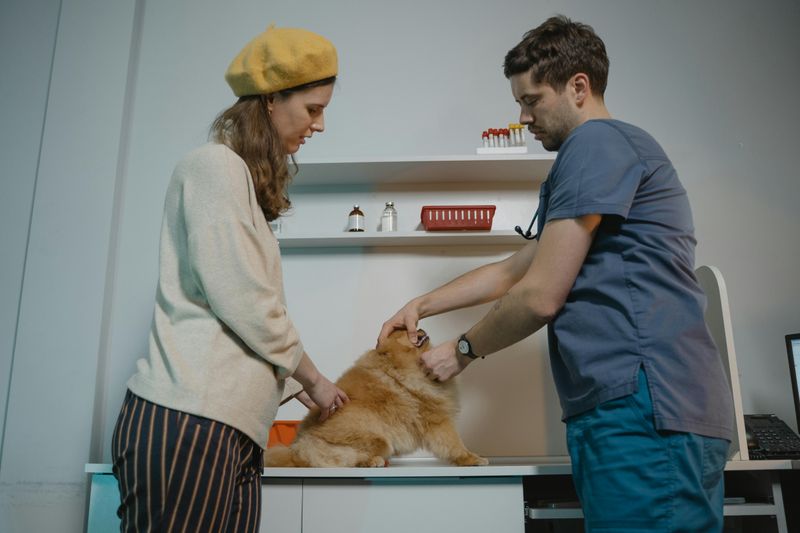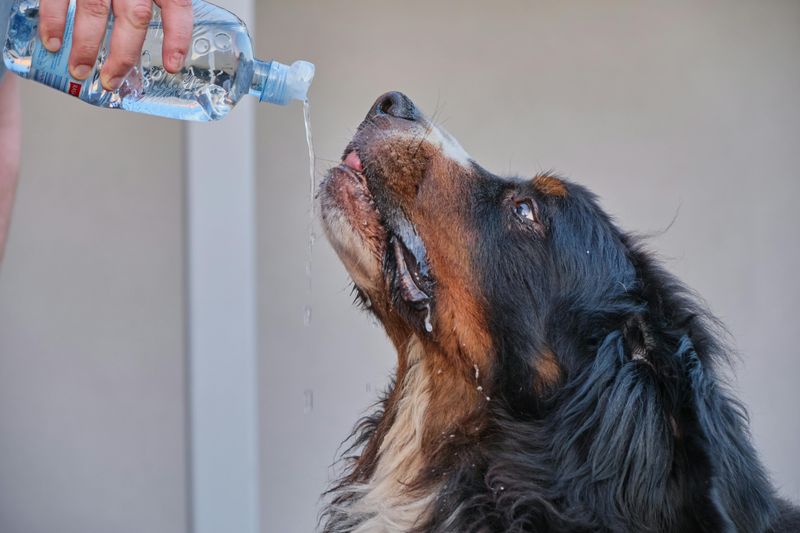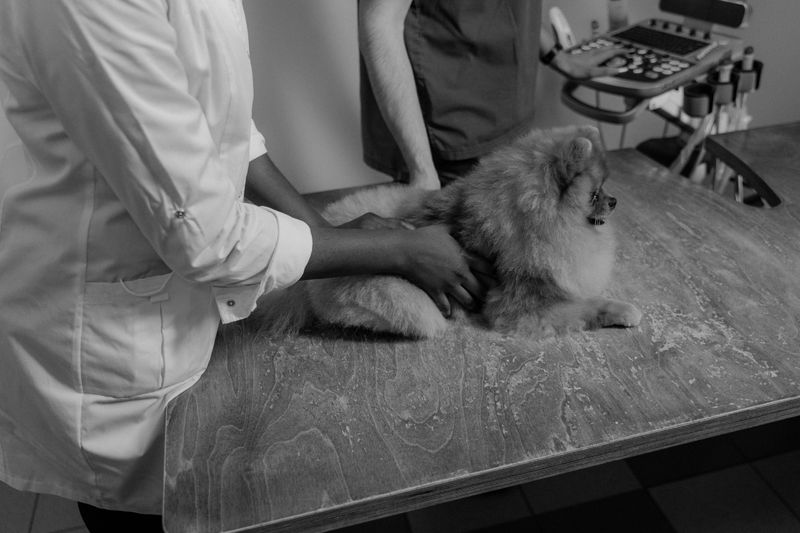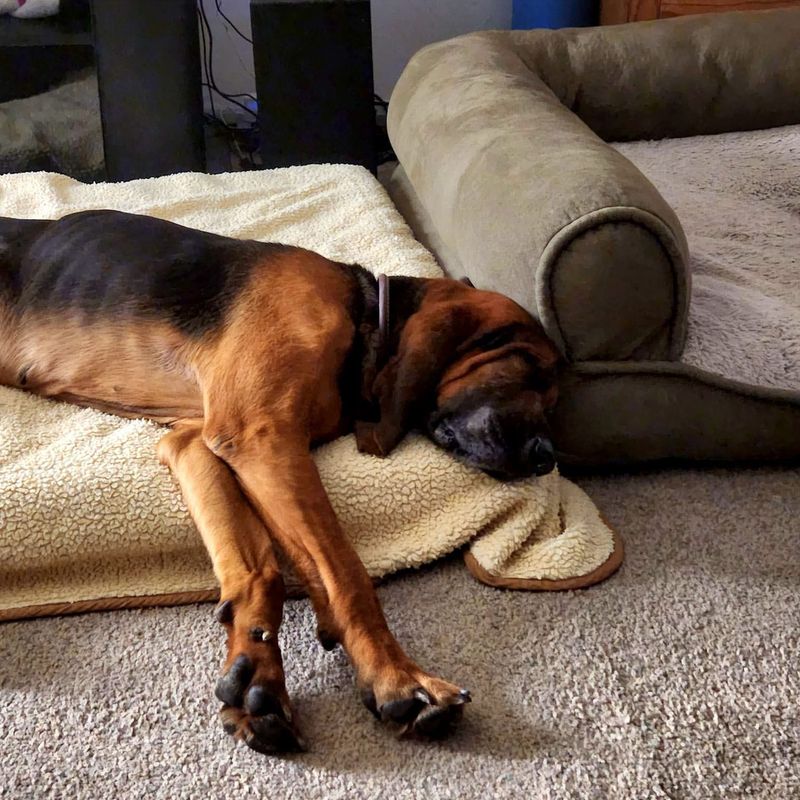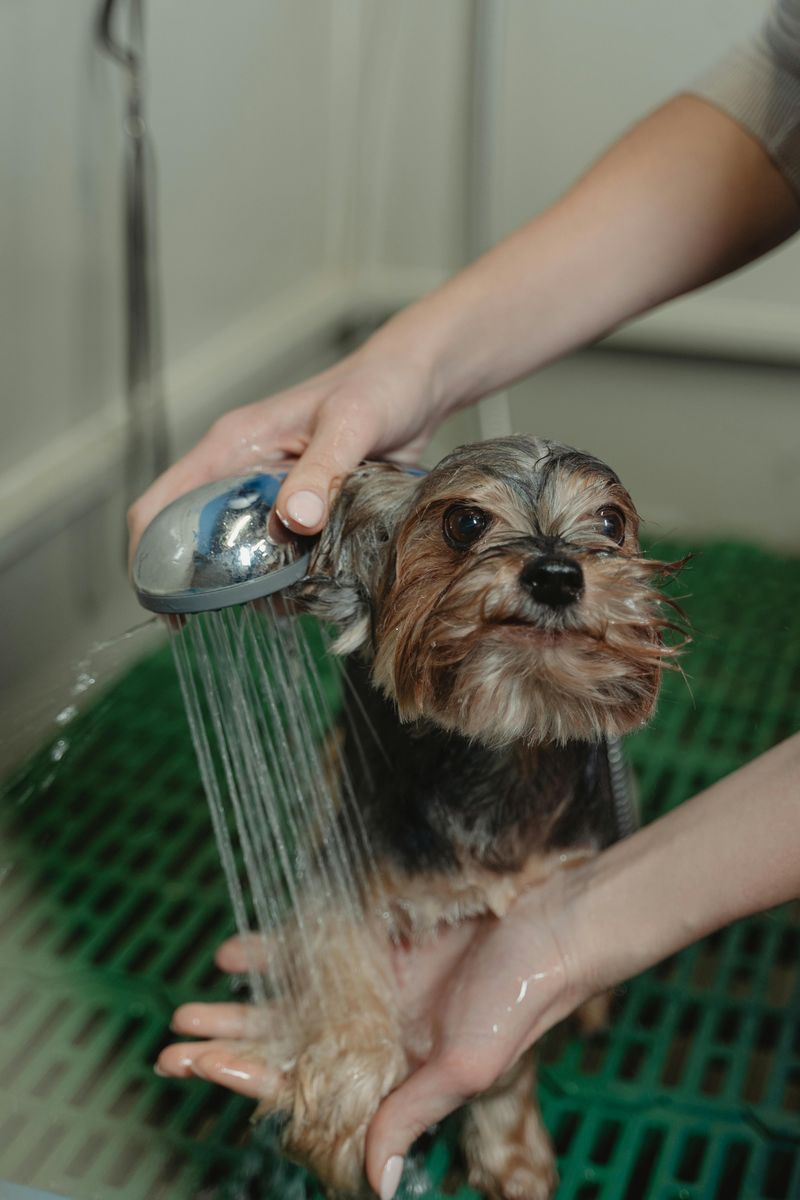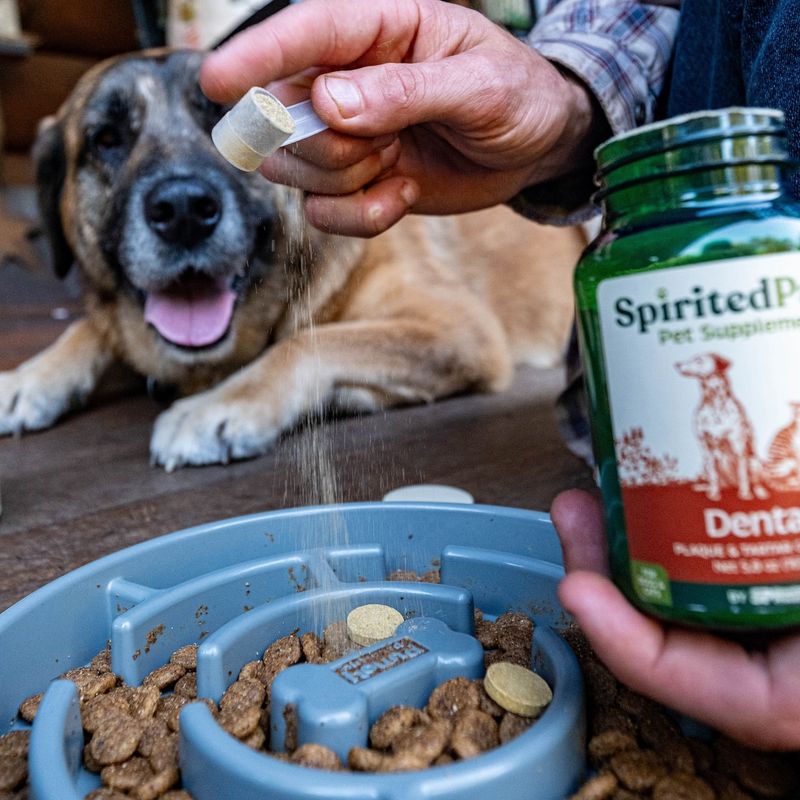Our furry friends deserve long, healthy lives filled with joy and companionship. Veterinarians recommend strategies to enhance your dog’s quality of life and longevity. From nutrition to mental stimulation, these tips are designed to promote your dog’s well-being and happiness. Here are 23 essential tips that can help your beloved canine live a longer and more fulfilling life.
Balanced Diet
Feeding your dog a balanced diet is crucial for their health. Ensure the food meets their nutritional needs. High-quality dog food, rich in proteins, vitamins, and minerals, supports muscle growth and energy. Consult your vet to tailor the diet to your dog’s age, breed, and activity level. Avoid overfeeding to prevent obesity, which can lead to various health issues. Small, consistent meals are preferable over large, infrequent ones. This helps maintain stable energy levels and digestion. Always provide fresh water to keep them hydrated. A balanced diet is a cornerstone for a long, healthy life.
Mental Stimulation
Mental stimulation is just as important as physical exercise for dogs. Engage their brains with puzzle toys, training sessions, or learning new tricks. These activities challenge their problem-solving skills and keep them mentally sharp. Interactive games like hide and seek or scent work are excellent for cognitive development. Rotate toys regularly to keep things interesting. Mental enrichment reduces anxiety and destructive behaviors, leading to a happier, more balanced pet. Spend time daily in mentally stimulating activities, and your dog will thrive both mentally and emotionally.
Routine Vet Check-ups
Regular vet check-ups are crucial for your dog’s health. Routine examinations can detect potential health issues early, allowing for timely intervention. Vaccinations and parasite control are vital for preventing diseases. Discuss your dog’s diet, exercise, and behavior with your vet to ensure comprehensive care. Dental check-ups are also important to prevent oral diseases. Establish a schedule for these visits, usually annually or biannually. A good relationship with your vet helps ensure your dog receives the best possible care throughout their life. Keeping up with vet visits can significantly enhance longevity.
Dental Care
Oral health is often overlooked but is vital for your dog’s overall well-being. Regular brushing helps prevent plaque buildup and gum disease, which can lead to serious health issues. Use dog-specific toothpaste and a soft brush for best results. Dental chews and toys can also aid in keeping teeth clean. Schedule regular dental check-ups with your vet to monitor oral health. Ignoring dental care can result in pain and difficulty eating, affecting your dog’s quality of life. Make dental hygiene a routine part of your dog’s care for a longer, healthier life.
Proper Hydration
Keeping your dog well-hydrated is essential for health. Water is crucial for digestion, temperature regulation, and nutrient absorption. Ensure clean, fresh water is always accessible, especially after exercise or in hot weather. Monitor your dog’s water intake to detect any changes that might indicate health issues. Dehydration can lead to serious problems like kidney damage. Adjust water availability based on diet, as dry foods may require more water. Encourage drinking by placing multiple water stations around the home. Proper hydration supports vital bodily functions and contributes to overall longevity.
Regular Exercise
Exercise is vital for your dog’s physical and mental well-being. Regular activities like walking, running, or playing fetch keep them fit and happy. It also helps control weight, strengthens muscles, and improves cardiovascular health. Find activities that match your dog’s energy level and breed characteristics. For high-energy breeds, consider agility training or hiking. Low-energy dogs may benefit from short, frequent walks. Exercise also relieves stress and boredom, reducing unwanted behaviors like chewing or barking. Make exercise a routine, and your dog will look forward to the quality time spent together.
Weight Management
Maintaining a healthy weight is crucial for your dog’s longevity. Obesity can lead to serious health issues such as diabetes, heart disease, and joint problems. Monitor your dog’s weight regularly and adjust their diet and exercise accordingly. Portion control and choosing the right food are key. Consult your vet to determine the ideal weight for your dog’s breed and age. Regular exercise helps burn calories and keep them fit. Recognize early signs of weight gain, like difficulty in movement or panting after mild activities. A balanced approach ensures a healthy and active life.
Socialization
Socialization plays a critical role in a dog’s behavior and happiness. Introduce your dog to various environments, people, and other pets. This helps them become well-adjusted and confident. Start socialization early, but it’s never too late to begin. Group playdates or dog parks are excellent for meeting new friends. Supervised interactions ensure safety and prevent aggressive behavior. Socialization reduces anxiety and fear, leading to a more relaxed and happy pet. Encourage positive experiences and reward good behavior. A well-socialized dog is more adaptable and enjoys a fuller, enriched life.
Safe Environment
Creating a safe environment is essential for your dog’s health and happiness. Remove hazards like toxic plants, electrical cords, or small objects they might swallow. Secure fences and gates to prevent escapes. Choose non-toxic cleaning products and avoid leaving harmful substances accessible. Provide a comfortable space with a cozy bed and toys. Safety measures reduce the risk of accidents and injuries, promoting a stress-free life. Regularly inspect your home and yard for potential dangers. A safe, loving environment allows your dog to thrive and enjoy a long, happy life by your side.
Parasite Control
Parasite control is vital for maintaining your dog’s health. Fleas, ticks, and worms can cause serious diseases and discomfort. Regularly check your dog for signs of parasites and consult your vet for appropriate prevention methods. Use vet-recommended treatments like topical solutions or oral medications. Keep your dog’s living area clean and wash bedding frequently. Regular grooming helps spot parasites early. Seasonal changes may require adjustments in prevention strategies. Consistent parasite control protects your dog from infections and contributes to their overall well-being. Stay vigilant to ensure a parasite-free, healthy life.
Quality Sleep
Adequate sleep is necessary for your dog’s physical and mental health. Dogs need a comfortable, quiet space to rest and recharge. Quality sleep supports immune function, tissue repair, and energy levels. Ensure their bed is cozy and located in a quiet area of your home. Establish a consistent bedtime routine to help them relax. Monitor their sleep patterns; changes can indicate health issues. Avoid disturbances during sleep time to promote restful slumber. Providing a nurturing sleep environment is crucial for a content and healthy pet, enhancing both quality and length of life.
Grooming Routine
Regular grooming is essential for your dog’s health and comfort. It involves brushing their coat, trimming nails, and cleaning ears. Grooming helps prevent skin issues and maintains coat quality. Regular brushing removes dirt and reduces shedding, while nail trimming prevents discomfort. Cleaning ears reduces infection risk. Choose grooming routines based on your dog’s breed and coat type. Professional grooming services can provide thorough care. Regular grooming also strengthens the bond between you and your pet. It’s an opportunity to check for abnormalities like lumps or ticks. A consistent grooming routine ensures a healthy, happy dog.
Stress Reduction
Reducing stress is vital for your dog’s health. Stress can lead to behavioral issues and affect overall well-being. Create a calm environment with predictable routines to minimize anxiety. Engage in relaxing activities like gentle petting or quiet walks. Provide a safe retreat where your dog can unwind. Recognize stress signs such as pacing or excessive barking and address them promptly. Positive reinforcement helps build confidence and security. Training your dog in stress-relief techniques can be beneficial. Ensuring a stress-free life fosters emotional well-being and contributes to a healthy, long life.
Spaying/Neutering
Spaying or neutering your dog has health and behavioral benefits. It reduces the risk of certain cancers and infections. Neutering reduces aggressive tendencies and roaming behaviors, decreasing accident risks. Consult your vet to determine the appropriate age for the procedure. Recovery is usually quick, with proper post-operative care. This procedure also helps control the pet population, reducing the number of strays. Weigh the pros and cons with your vet to make an informed decision. Spaying or neutering is a responsible choice that contributes to a healthier and longer life for your dog.
Proper Training
Proper training is key to a well-behaved and happy dog. Basic obedience commands like sit, stay, and come are essential for safety and social interactions. Training strengthens your bond and promotes trust. Use positive reinforcement techniques for effective learning. Enroll in training classes for professional guidance. Address behavioral issues early to prevent them from becoming habits. Consistency and patience are vital for successful training. Training also provides mental stimulation, keeping your dog engaged and satisfied. A well-trained dog is confident and enjoys a harmonious relationship with their owner, enhancing their quality of life.
Senior Dog Care
As dogs age, their needs change. Senior dog care focuses on maintaining quality of life. Adjust their diet to accommodate slower metabolisms and joint health. Regular vet visits become even more crucial to monitor for age-related issues. Provide orthopedic beds for comfort and ease joint pain. Adjust exercise routines for gentler activities. Keep their mind active with appropriate challenges. Monitor for changes in behavior, appetite, or mobility, as these can indicate health concerns. Compassionate care and understanding of their needs ensure a comfortable and fulfilling life for your aging companion.
Monitoring Changes
Monitoring changes in your dog’s behavior, diet, or energy levels is crucial for early detection of health issues. Subtle changes can be early signs of illness. Keep a journal to track any noticeable changes. Consult your vet if you observe persistent or concerning shifts. Regular observation helps in understanding their normal behavior, making it easier to spot anomalies. Early intervention can lead to better outcomes and less invasive treatments. Being attentive to your dog’s signals ensures timely medical attention and contributes to their long and healthy life.
Vaccinations
Vaccinations protect your dog from contagious and potentially fatal diseases. They are a vital part of preventative health care. Consult your vet to establish a vaccination schedule tailored to your dog’s age, lifestyle, and location. Core vaccines typically include rabies, distemper, and parvovirus. Regular booster shots maintain immunity. Vaccination prevents disease spread and protects other pets and humans. Keep records up to date for travel or boarding requirements. Discuss any concerns with your vet to ensure your dog’s safety. Vaccinations are essential for a healthy and long life.
Quality Time
Spending quality time with your dog strengthens your bond and enhances their happiness. Dogs thrive on attention and companionship. Engage in activities both you and your dog enjoy, such as playing fetch, cuddling, or exploring new places. Quality time reduces boredom and anxiety, promoting mental well-being. It also provides opportunities for training and reinforcing positive behaviors. Prioritize regular interactions despite a busy schedule. Consistent attention and love contribute to your dog’s emotional health and longevity. Cherishing these moments enriches both your lives.
Nutritional Supplements
Nutritional supplements can support your dog’s health, especially as they age. Supplements like omega-3 fatty acids promote joint health and a shiny coat. Probiotics aid digestion, while antioxidants boost the immune system. Always consult your vet before adding supplements to ensure they suit your dog’s specific needs. They can recommend correct dosages and reputable brands. Over-supplementation can be harmful, so follow guidance carefully. Supplements can complement a balanced diet, supporting longevity and overall well-being. Thoughtful use of supplements contributes to a healthier, more vibrant life for your dog.
Hygiene Practices
Good hygiene practices prevent health issues and promote comfort. Regularly clean your dog’s paws, especially after outdoor activities, to remove dirt and allergens. Bathing should be done as needed, using dog-specific products to maintain skin health. Clean your dog’s bedding frequently to avoid pests and germs. Pay attention to ear cleanliness to prevent infections. Routine hygiene checks can reveal early signs of health problems. Good hygiene contributes to your dog’s overall health and reduces the risk of disease. Establishing these practices ensures a clean, comfortable, and happy life for your dog.
Safe Travels
Safe travel is essential to protect your dog from harm. Use pet seatbelts or crates during car rides to prevent injury in case of sudden stops. Plan regular breaks on long trips for hydration and exercise. Ensure your destination is pet-friendly and has necessary amenities. Prepare a travel kit with food, water, and medical supplies. Monitor your dog for signs of stress or discomfort during travel. Ensuring safety and comfort while traveling allows your dog to enjoy new experiences without risk. Thoughtful planning promotes enjoyable and secure adventures for you and your pet.



